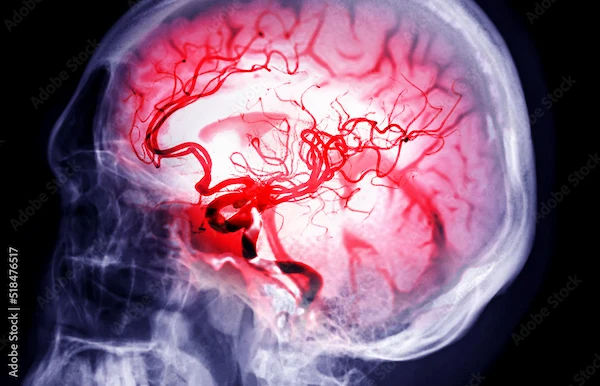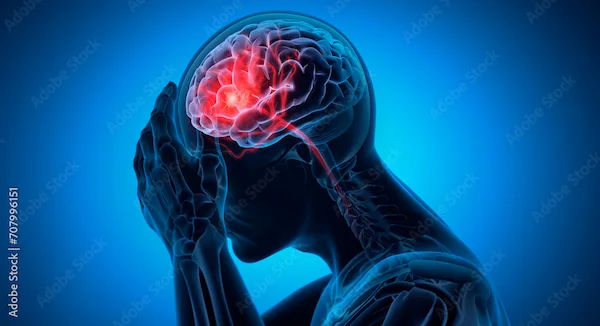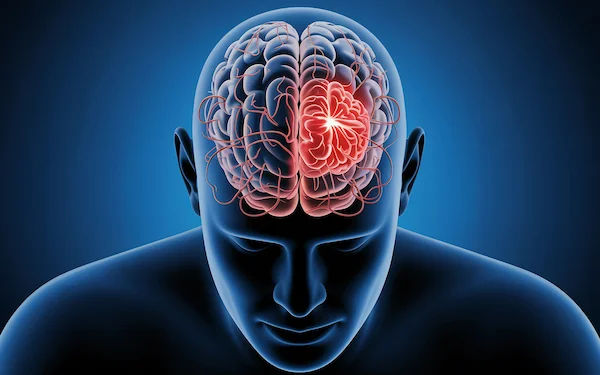Guide to Sex Being a Common Cause of Brain Stroke
Learn about the link between sex and brain stroke, including how sexual activity may act as a rare trigger, the underlying risk factors, warning signs, and tips for prevention.

Written by Dr. J T Hema Pratima
Reviewed by Dr. Rohinipriyanka Pondugula MBBS
Last updated on 13th Jan, 2026

Introduction
Sexual activity is a normal and healthy part of life for many adults. However, for a very small number of people, it can be associated with a rare but serious medical event: a stroke. The idea of a stroke occurring during or after sex can be alarming, but understanding the link is the first step toward prevention and peace of mind. This article demystifies the connection between sex and stroke, separating fact from fear. We will explore the common physiological causes, identify key risk factors, and outline the crucial warning signs you should never ignore. Most importantly, we’ll provide a practical guide on how to mitigate risks and maintain a healthy, fulfilling intimate life. Knowledge is power, and being informed is your best defense.
Understanding the Link Between Sex and Stroke
The connection between sexual activity and stroke isn't about the act itself being inherently dangerous. Instead, it's about the significant, albeit temporary, physiological changes that occur in the body during arousal and orgasm. For the vast majority of people, these changes are perfectly normal and safe. However, for individuals with certain pre-existing vulnerabilities, this surge can act as a trigger for a cerebrovascular event.
The Physiological Stress of Sexual Activity
Sex is a form of physical exertion. Like any exercise, it causes a natural increase in heart rate, blood pressure, and breathing. Studies have shown that systolic blood pressure (the top number) can rise significantly during orgasm. For a healthy cardiovascular system, this is manageable stress. But if someone has weakened blood vessels or severe hypertension, this sudden pressure spike can potentially cause a vessel to rupture (hemorrhagic stroke) or contribute to a clot breaking loose (ischemic stroke).
How Underlying Conditions Play a Role
The real risk lies not in sex, but in undiagnosed or poorly managed health conditions. Think of it like lifting a heavy weight; a healthy person can do it safely, but someone with a bad back might get injured. Similarly, conditions like uncontrolled high blood pressure, aneurysms (weak spots in artery walls), or atherosclerotic plaque (buildup in arteries) create the underlying weakness. The physical exertion of sex is simply the potential trigger that exposes this vulnerability.
Consult Top Specialists for Personalised Tips
Common Causes of Stroke During or After Sex
When a stroke is linked to sexual activity, it typically falls into one of these categories, often involving a pre-existing condition.
The Surge in Blood Pressure (Hypertensive Crisis)
This is one of the most common mechanisms. The intense, acute rise in blood pressure during orgasm can, in rare cases, overwhelm a blood vessel in the brain.
Cervical Artery Dissection: A Rare but Serious Trigger
This is a tear in one of the arteries in the neck that supply blood to the brain. While often associated with sudden neck movements (like in whiplash), the strenuous activity and possible sudden head movements during sex can, in extremely rare instances, cause such a tear. The tear can create a clot that travels to the brain, causing an ischemic stroke.
Cardiac Causes: When the Heart is the Culprit
Certain heart conditions, like atrial fibrillation (an irregular heartbeat), can cause blood clots to form in the heart. The increased heart rate and blood flow during sex could potentially dislodge one of these clots, sending it to the brain and causing a stroke. It’s crucial to distinguish this from a heart attack, which is a blockage in the heart's own blood supply.
Recognizing the Signs: Stroke Symptoms to Watch For
Time is brain. Recognizing stroke symptoms and acting immediately is critical. The symptoms are the same whether related to sex or not.
The FAST Acronym: A Lifesaving Reminder
Face: Ask the person to smile. Does one side of the face droop?
Arms: Ask them to raise both arms. Does one arm drift downward?
Speech: Ask them to repeat a simple phrase. Is their speech slurred or strange?
Time: If you see any of these signs, call emergency services immediately.
Risk Factors: Who Should Be Most Cautious?
Understanding your personal risk is key to prevention.
Pre-existing Health Conditions
Hypertension (High Blood Pressure): The number one modifiable risk factor.
Smoking: Damages and weakens blood vessels.
High Cholesterol: Leads to plaque buildup that can narrow or block arteries.
Diabetes: Increases the risk of cardiovascular disease.
Obesity: Linked to hypertension, diabetes, and high cholesterol.
Existing Heart Disease: Especially atrial fibrillation.
History of Stroke or Aneurysm.
Lifestyle and Behavioral Factors
Use of stimulants or illicit drugs (e.g., cocaine, amphetamines) that drastically spike blood pressure.
Excessive alcohol consumption.
A sedentary lifestyle contributes to other risk factors.
Prevention is Key: How to Reduce Your Risk
The goal isn't to avoid sex but to make it as safe as possible by managing your health.
Managing Your Overall Health
This is the most effective strategy. If you have conditions like hypertension or diabetes, working with your doctor to manage them is non-negotiable. Taking prescribed medications consistently is vital. Apollo24|7 offers a convenient home collection for tests like HbA1c and lipid profiles, making it easier to monitor your health regularly. Adopting a heart-healthy lifestyle—a balanced diet, regular exercise, maintaining a healthy weight, and not smoking—dramatically reduces your baseline risk, making the physiological changes during sex insignificant in comparison.
Creating a Safe Environment
Communicate with your partner, especially if you have known health concerns. Avoid sexual activity when you are overly stressed, fatigued, or have consumed excessive alcohol. For those with significant heart disease, a doctor might advise on positions that are less physically strenuous.
What to Do in a Suspected Stroke Emergency
Do not wait to see if the symptoms go away. Every minute counts. Call emergency services immediately. Note the time when the symptoms first appeared, as this is critical information for medical teams. While waiting for help, keep the person calm and lying down in a safe position.
Living a Healthy, Fulfilling Life After a Stroke
For stroke survivors, returning to a normal life, including intimacy, is a common goal.
Returning to Intimacy Safely
It is generally safe to resume sexual activity after a stroke, but it must be approached with care and medical guidance. It is essential to consult your neurologist or cardiologist for personalized advice. They can assess your recovery and provide clear recommendations. Fear and anxiety are common, so open communication with your partner and, potentially, a therapist, is incredibly beneficial.
Conclusion
The link between sexual activity and stroke, while real, is often misunderstood and shouldn't be a source of fear for healthy individuals. The overwhelming evidence shows that the benefits of a healthy sex life far outweigh the extremely minimal risks for most people. The core message is one of proactive health management. By understanding your personal risk factors, committing to regular check-ups, and adopting a heart-healthy lifestyle, you empower yourself to enjoy a fulfilling life without undue worry. If you have specific concerns about your blood pressure or cardiovascular health, consult a doctor online with Apollo24|7 for further evaluation and a personalized management plan. Your health is the foundation of your well-being, in every aspect of life.
Consult Top Specialists
Consult Top Specialists for Personalised Tips

Dr. Rajib Ghose
General Physician/ Internal Medicine Specialist
25 Years • MBBS
East Midnapore
VIVEKANANDA SEBA SADAN, East Midnapore

Dr. Soumen Paul
General Physician/ Internal Medicine Specialist
24 Years • MBBS
Kolkata
MCR SUPER SPECIALITY POLY CLINIC & PATHOLOGY, Kolkata
(50+ Patients)

Dr. Rohit Basu
General Practitioner
8 Years • MBBS, DNB (General surgery)
East Midnapore
VIVEKANANDA SEBA SADAN, East Midnapore
Dr. Paras Gangwal
General Physician/ Internal Medicine Specialist
28 Years • MBBS,MD General Medicine
Delhi
Dr Paras Gangwal Clinic, Delhi

Dr. Aritra Kumar Ray
General Physician/ Internal Medicine Specialist
10 Years • MBBS, MD (General Medicine)
East Midnapore
VIVEKANANDA SEBA SADAN, East Midnapore
Consult Top Specialists

Dr. Rajib Ghose
General Physician/ Internal Medicine Specialist
25 Years • MBBS
East Midnapore
VIVEKANANDA SEBA SADAN, East Midnapore

Dr. Soumen Paul
General Physician/ Internal Medicine Specialist
24 Years • MBBS
Kolkata
MCR SUPER SPECIALITY POLY CLINIC & PATHOLOGY, Kolkata
(50+ Patients)

Dr. Rohit Basu
General Practitioner
8 Years • MBBS, DNB (General surgery)
East Midnapore
VIVEKANANDA SEBA SADAN, East Midnapore
Dr. Paras Gangwal
General Physician/ Internal Medicine Specialist
28 Years • MBBS,MD General Medicine
Delhi
Dr Paras Gangwal Clinic, Delhi

Dr. Aritra Kumar Ray
General Physician/ Internal Medicine Specialist
10 Years • MBBS, MD (General Medicine)
East Midnapore
VIVEKANANDA SEBA SADAN, East Midnapore
More articles from Stroke
Frequently Asked Questions
Can orgasm itself cause a stroke?
No, an orgasm itself does not cause a stroke. It is the associated temporary spike in heart rate and blood pressure that, in extremely rare cases, can trigger a stroke in individuals who already have significant underlying vulnerabilities like an untreated aneurysm or severe hypertension.
How common is stroke during sex?
It is exceptionally rare. Studies estimate that only about 0.5% to 2% of all strokes are attributed to sexual activity. For context, the absolute risk remains very low, especially for those without cardiovascular risk factors.
What is the difference between a stroke and a heart attack during sex?
A stroke is a disruption of blood flow to the brain, either from a clot (ischemic) or bleeding (hemorrhagic). A heart attack is a blockage of blood flow to the heart muscle. Both are serious emergencies but affect different organs. The symptoms differ: stroke symptoms are neurological (face, arms, speech), while heart attack symptoms often involve chest pain, shortness of breath, and pain radiating to the arm or jaw.
Is it safe to have sex if I have high blood pressure?
Yes, it is generally safe if your high blood pressure is well-managed with medication and lifestyle changes. In fact, regular physical activity like sex can be beneficial. The key is to have your condition under control. If your condition does not improve after trying these methods, book a physical visit to a doctor with Apollo24|7 to adjust your treatment plan.
What should I do if I get a sudden bad headache after sex?
A mild headache is common and usually benign ('orgasmic headache'). However, if you experience a sudden, severe, and explosive 'thunderclap' headache—the worst headache of your life, you must seek emergency medical care immediately, as this can be a sign of a brain hemorrhage.




